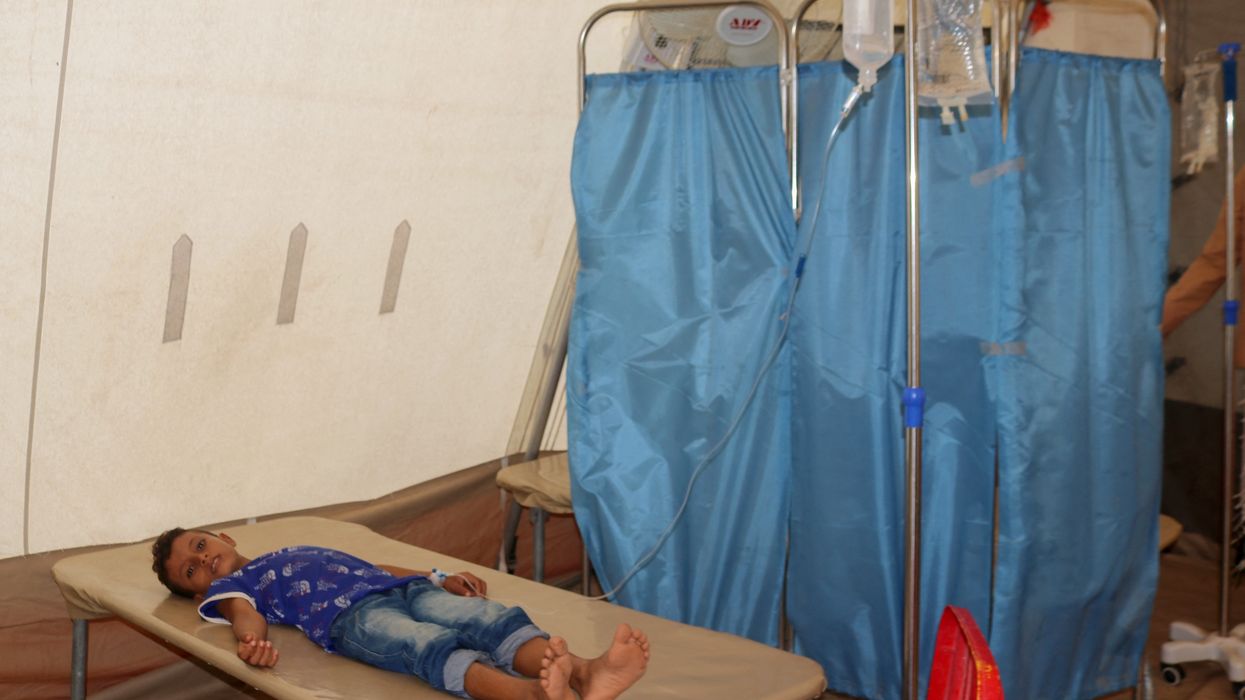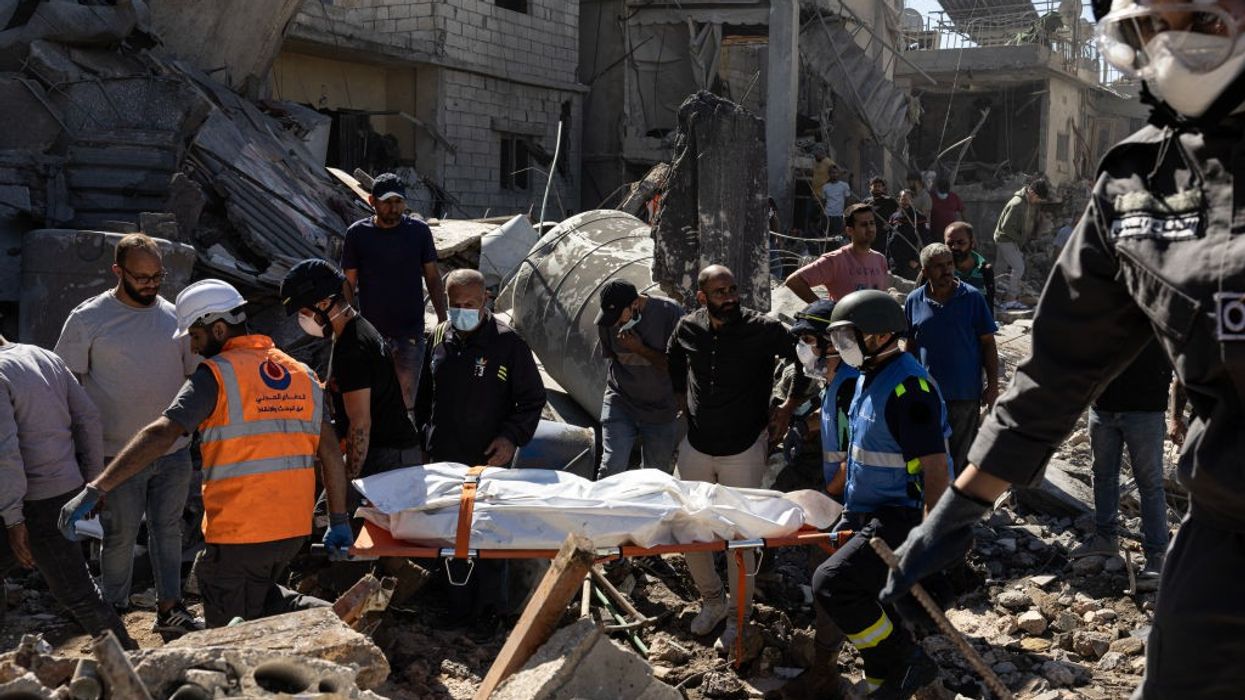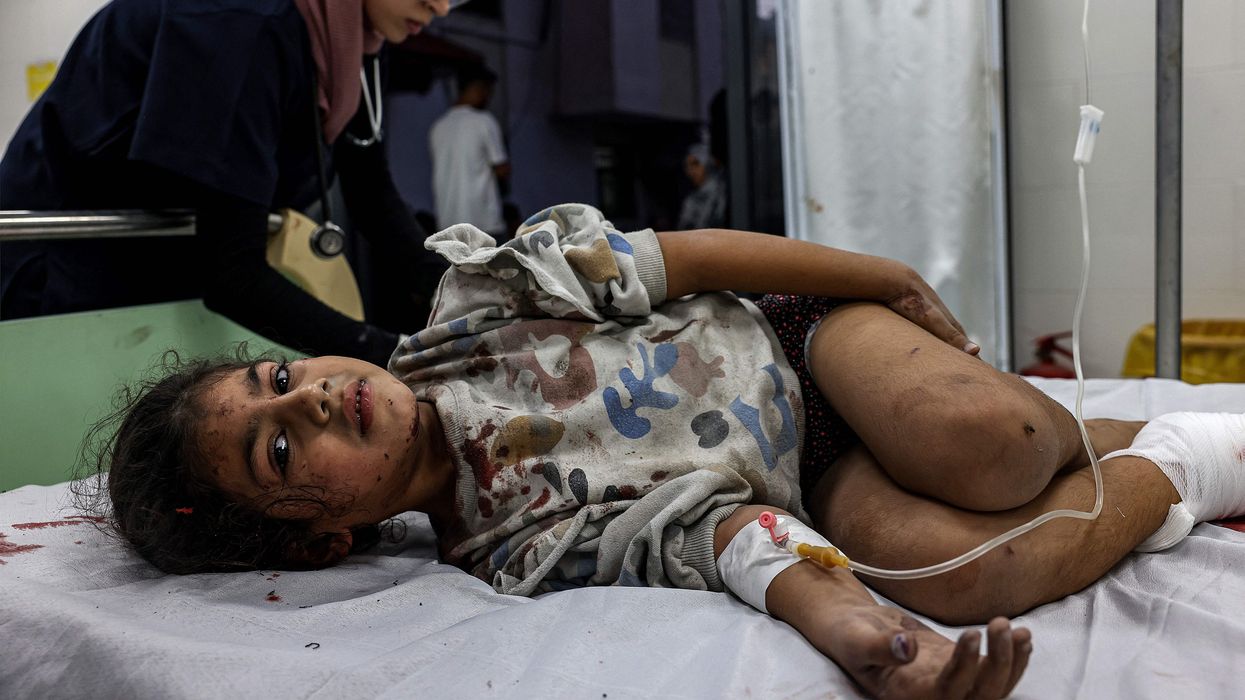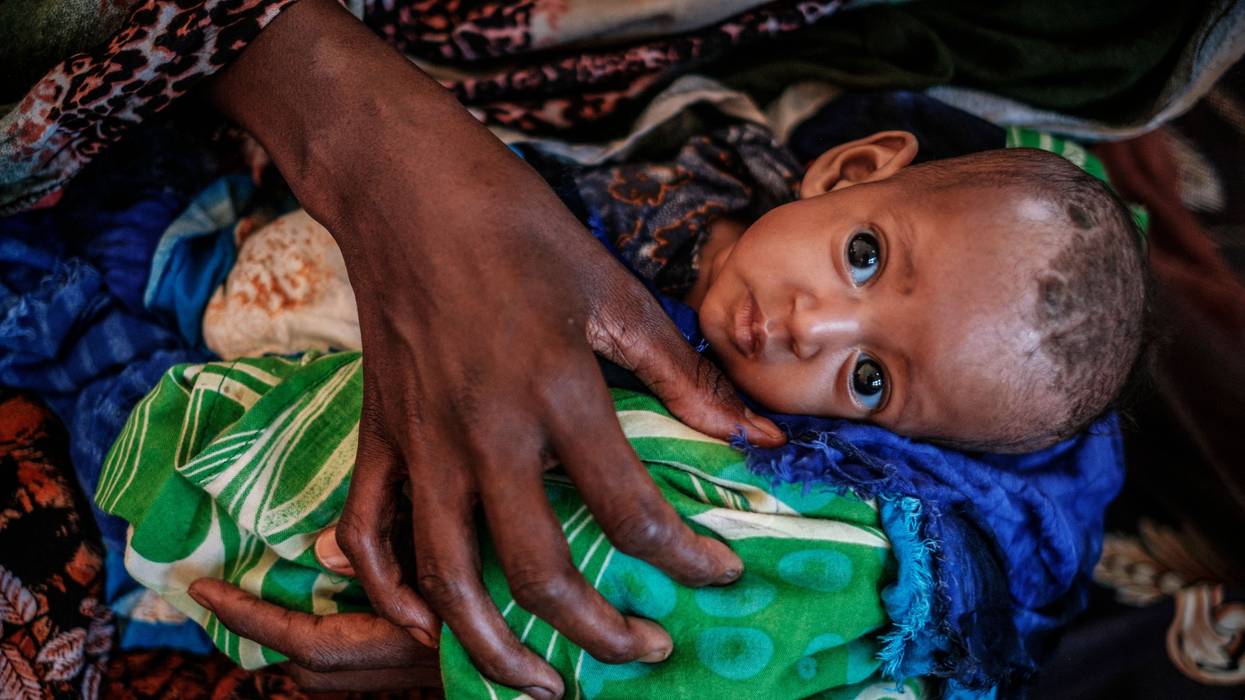War Makes the World Sick... Literally
The body of a single child, wasting away from the lack of the basic fluid that runs in my sink or yours, best captures the way war casualties ripple across time and populations.
War kills in so many ways. These days, Americans are bombarded with images from Gaza and elsewhere of people or broken bodies being ferried on stretchers from the rubble of homes and hospitals, by rescue workers whose thin bodies and stricken faces suggest they are barely better off than those they’re helping. Social media and journalists make us eyewitnesses to emaciated children too weak to cry. And yet, compared with air raids that crush and bloody instantaneously, a slower disaster, more difficult to capture (especially given our made-for-TikTok attention spans), consists of the hours that many people in war zones spend wasting away from infectious diseases of one sort or another.
Let me count a few of the ways.
In Iraq in 2004, three-month-old Ali tries to cry but he’s too weak to make a sound, since his body has been ravaged by diarrhea. Between 2003 and 2007, half of Iraq’s 18,000 doctors left the country due to the deteriorating security situation (with few intending to return). Health facilities had also been bombed out and destroyed. By then, about two-thirds of the deaths of children under the age of five, like Ali, were due to respiratory infections and diarrhea compounded by malnutrition.
Consider what it would do if someone you loved perished because they were born in the wrong place at the wrong time in the storm of war that destroys infrastructure so central to our lives that normally we barely even notice its presence.
In Pakistan in 2017, one of a handful of countries that has yet to eliminate the polio virus, the father of a five-year-old boy is inconsolable when he learns that his son will never walk on his own again. Among displaced people in the Afghan-Pakistani border region where they lived, concerns about counterinsurgency air raids from U.S. and later Pakistani government and opposition forces, security threats toward vaccination teams in conflict-torn parts of that country, and suspicions among parents like that boy’s father that health workers had been sent by the U.S. government to sterilize Pakistani children, all prevented kids from getting the immunizations that they needed.
In Burkina Faso in 2019, three-year-old Abdoulaye dies after contracting malaria while in a shelter for people internally displaced by violence between government forces and Islamic militias. Malnourished and anemic, without direct access to a health clinic, he succumbs to a treatable illness.
In Fayetteville, North Carolina in 2020, as in other military towns across the U.S., rates of sexually transmitted infections like syphilis, herpes simplex, and HIV are among the highest in the country. Bases tend to drive up poverty among civilians by making the surrounding populations dependent on low-wage service work. And stressed-out, war-traumatized American soldiers are more likely to engage in risky sexual behavior that spreads disease among the broader population.
In Ukraine in 2023, a soldier treated for severe burns dies of sepsis, despite being given multiple antibiotics. Doctors found klebsiella, a multi-drug-resistant pathogen, in his body. Despite successful efforts by the Ukrainian government to curb antimicrobial resistance in its population prior to Russia’s 2022 invasion, mounting casualties, along with shortages of supplies and personnel, mean that Ukrainian health workers now try to do whatever they can to keep soldiers alive. In the long term, antibiotic-resistant infections traceable to Ukrainian patients are already beginning to appear in places as distant as Japan.
In May 2025 in the Gaza strip, four-month-old Jenan dies from chronic diarrhea after losing half her bodyweight. She needed hypoallergenic milk formula, but aerial bombardments and blockades of basic food and medical supplies have made that once common product scarce. As anthropologist Sophia Stamatopoulou-Robbins points out, prior to the start of the war between Israel and Hamas in October 2023, cases of diarrhea in young children there averaged about 2,000 per month. In April of the following year, however, such cases already numbered more than 100,000. Likewise, in the decade before the war, there were no large-scale epidemics in Gaza. In just the first seven months of that conflict, however, overcrowding in makeshift shelters, nutritional deficits, shortages of hygiene products—only 1 in every 3 Gazans has soap!—and contaminated water have led to new outbreaks of infectious diseases like measles, cholera, typhoid, and polio, exacerbated by widespread starvation.
At some level, it couldn’t be simpler. War destroys all too many of the modern amenities that make life possible. Preventable illness and death occur even in industrialized settings that are marked by inequality, lack of information, psychological trauma, or just the chaos of combat that hinders long-term thinking. In poor- and middle-income countries like Yemen, Syria, and Nigeria, infectious diseases were already among the top causes of death, even before the outbreak of significant conflicts. Their incidence, however, grew so much worse in wartime, especially among civilians who didn’t have the same access to doctors and medical hospitals as armed groups.
The body of a single child, wasting away from the lack of the basic fluid that runs in my sink or yours, best captures the way war casualties ripple across time and populations. For every soldier who dies in battle, exponentially more people suffer deaths from malnutrition, disease, or trauma-related violence even after battles end. Preventable infections play a large role in this story.
The War on Children
Children are particularly vulnerable to sickness and death in armed conflicts because of their immature immune systems, greater nutritional needs, tendency to succumb more easily to dehydration, and reliance on families who may not even be around to care for them. A study of more than 15,000 armed-conflict events in 35 African countries found that children aged 10 or younger were far more likely to die if they lived within 100 kilometers of a battle zone than they would have in earlier periods of peacetime. Increases in mortality ranged from 3% to about 27%, varying with how many people also died in nearby battles. Strikingly, many more babies under the age of one died annually in the eight years following a conflict’s end than while the battles were going on—infectious disease being a primary killer.
Take Yemen as an example of how war may affect young children and their families over time. Since the start of that country’s civil war in 2015, cholera, a waterborne illness doctors have known how to prevent since 1954, has ravaged the most vulnerable members of that country’s population, particularly children, due to a lack of appropriate sanitation or reasonable access to healthcare. As of December 2017, more than a million people had contracted the disease, nearly half of them children, and more than 2,000 had died of the illness. Compare that to the more than 10,000 Yemenis estimated to have died in direct combat by that time, and you get an idea of how significantly death by illness counts among the casualties of war.
Nearly a decade later, in fact, there are hundreds of thousands of new cases of that illness in Yemen each year and hundreds of annual deaths, making up more than a third of all cases globally. When Rami discovered that his daughters, aged 10 and 7, had cholera, he managed to scrape together the equivalent of about $15 to travel to a clinic so that the family could get lifesaving fluids and information to prevent further cases. Many families like his, however, can’t afford such treatment, forcing all too many of them to delay care or even experience the unthinkable: losing a child.
Consider what it would do if someone you loved perished because they were born in the wrong place at the wrong time in the storm of war that destroys infrastructure so central to our lives that normally we barely even notice its presence. I hope it’s an experience that neither you nor I ever have.
War and Displacement
Still, I think about such things every day, as I bet do many of my colleagues connected to the Costs of War Project. When we first launched that project in 2011, Professors Catherine Lutz, Neta Crawford, and I met with experts in armed conflict to discuss how we would cover the issue of war’s health impacts. Repeatedly, they reminded us of how hard it is to talk about war and health without understanding what it’s like for families to be forced to leave their homes in search of safety.
Unsurprisingly, refugees and internally displaced people (IDPs) are uniquely vulnerable to disease and illness. Anyone who has gotten sick while traveling knows that the challenges of getting care are compounded by a lack of knowledge of the community you find yourself in. In the case of today’s more than 122 million war refugees or displaced people, stigma and harassment are frequent travel companions. According to one meta-analysis, more than one-fifth of refugee and IDP women have experienced some form of sexual violence while living in displacement settings. A study of more than 500 immigrants and refugees in Italy found that nearly half experienced physical violence, sexual abuse, harassment, or workplace discrimination.
How did we get to a time when our leaders seem loath to invest in healthcare and don’t even hide their disdain for poor people, a significant number of whom are military personnel and veterans?
The stories that extremist politicians tell about migrants—think of President Donald Trump’s tall tale of supposedly dog- and cat-eating Haitians in Springfield, Ohio—distract us from the social problems such politicians seem unwilling to deal with like loneliness and poverty. Displaced persons lack political clout and voting power in places that host them and, in actual war zones, fighters rarely respect shelters and camps designated for their survival.
For people who flee their homes, the basic boring stuff is lacking, too. Only 35% of refugees have clean drinking water where they live, while less than a fifth of them have access to toilets. Imagine how that would affect all of the higher-order things you value in your life, including gatherings with people you care about, if you couldn’t even find a decent place to wash your hands or brush your teeth!
Most of all, what stands out to me as both a social worker and a scholar of war is how people forced to leave their communities end up losing connections to health providers they trust. I can’t tell you how many individuals I’ve met in clinical and humanitarian settings who had declined to seek care for Covid-19, pneumonia, severe flu symptoms, and other illnesses because they lacked confidence that professionals in their host communities had their best interests at heart.
My Government’s Assault on Public Health
As Republicans in Congress passed a bill that would deprive millions of Americans of health insurance in the near term, as high-level officials spread disinformation about vaccines for once-eradicated illnesses like measles, and as public health workers and officials face threats of violence, all too many poor Americans are starting to experience the sorts of obstacles to healthcare common in war zones.
Meanwhile, with the Trump administration’s decisions earlier this year to fire at least 2,000 U.S. Agency for International Development workers and freeze foreign aid dollars used (in part) to treat and monitor infectious diseases elsewhere on this planet, the threat that a foreign pandemic might make it to this country has grown considerably.
To quote Senator Joni Ernst (R-Iowa) at a recent town hall with constituents worried about losing healthcare, “We are all going to die.” While that is indeed so, it also matters how. A long life with access to basic services like immunizations and clean water is one of the differences between dying like a human being and dying like one of the wild animals I find in my rural area, infected by bacteria in the water or exhausted from heat exposure.
How, I wonder, did we Americans reach a place where many of us are silent or supportive of a strongman’s $45 million birthday military parade that closed roads to residents and commuters for days? How did we get to a time when our leaders seem loath to invest in healthcare and don’t even hide their disdain for poor people, a significant number of whom are military personnel and veterans?
I’m not sure I know what this country stands for anymore. I don’t know about you, but these days America sometimes feels to me like a treacherous foreign land.



